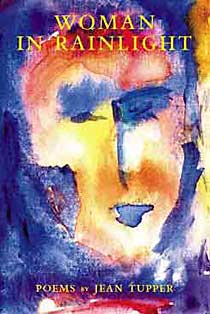Woman in Rainlight
Poems by Jean Tupper
Here are poems that please and surprise. Feet do an underwater dance, searching for quahogs; a woman clothes herself in tsunami blue; a dreamer becomes Jacob’s ladder and feels the slippered feet of angels ascending and descending. In these vividly detailed meditations, Jean Tupper shows us our world transformed and gleaming in rainlight.
—Theodore Deppe
This book is universal. It’s like dwelling in a sanctuary of love. It was a healing thing for me to read it.
—Susan Deborah King
Jean writes poetry that sings with humor, irony, wit, wisdom, and the gentle touch that so distinguishes both woman and poet.
—Pit Menousek Pinegar
. . . [this book] will be a lovely gift to the reading public and make poetry lovers out of the most cynical.
—J. Lorraine Brown
Her poems are so tight and precise and full of clarity . . . they are clear, precious gems; they shine.
—Pat Fargnoli
There are poets whose work opens our eyes to the life mistakenly called ordinary. Ballroom dancing, WiteOut, chowder, a pillbox, flannel sheets are the unlikely vehicles for Tupper’s startling observations of domestic life wild at the core. These poems of beauty and loss take us into rooms where fabric “refuses to be a curtain till dawn.”
—Suzanne Cleary
. . . [these poems] move convincingly between humor and heartbreak. Woman in Rainlight chronicles all of our lives: from the making of clam chowder to children going off to college; from weddings and first grandchildren to the loss of a family home and one’s parents . . . Jean Tupper’s great gift lies in her compassionate transformation of these everyday events. She sees in the small intimacies of family life, instances of the complexity of human nature: a father who needs to pass down his knowledge of a box knot as if it were a family heirloom; the small looks that pass between husband and wife that reveal, as Wallace Stevens said, “unexpected magnitudes”; the way her aging mother reviews her past in the colors of the pills she now must take. Jean Tupper’s Woman in Rainlight is full of the home-grown knowledge of someone who has lived well, who knows how we fit knitted sweaters to our backs and our “backs to burdens” and to loving the world as it is rather than how we would like it to be.
—Robert Cording

About the Author
JEAN TUPPER has worked as a magazine writer and editor, but her current writing love is poetry. Her work has been published in many fine literary magazines and she is a frequent workshop facilitator and mentor to developing writers. She has been associated with the Fine Line Poets in Massachusetts, and the Wood Thrush Poets, a Connecticut-based group of poets who have been colleagues and friends for 25 years. She has given many readings with these groups, in schools, libraries, and bookstores throughout New England.
A graduate of the Simmons College School of Publication, Jean completed her MA in English at Central Connecticut State University. She has also studied at The Frost Place in Franconia, New Hampshire, the Mt. Holyoke Writers’ Conference, and the Fine Arts Work Center in Provincetown, Massachusetts.
While living in Connecticut—until 1990, when she returned to the Boston area—she was a member and secretary of the Connecticut Poetry Society and taught creative writing at New Horizons in Farmington, a unique facility for the physically challenged. She also worked with Services for the Elderly.
Currently, she lives with her husband Russ in Wrentham, Massachusetts, is “Mom” to another poet, Nancy Tupper Ling, and “Nana” to Elizabeth and Sarah.
PAPA'S KNOT
That summer when he was seventeen
Papa, who’s always been a hard worker,
sweated it out at Mr. Bird’s company
which when he was growing up
in that Massachusetts town was the one
to work for. Everyone worked there, his dad too.
It got its name from Charlie, the #1 Bird man,
who made his first million in paper.
The rest came later, from roofing and shingles.
Papa slaved in “the box shop” that summer
and the next, which as he tells it meant
hot as blazes, something always coming at you
on that conveyer belt: hundreds of boxes,
folded down and stacked up, twenty-five to a batch.
That’s how his fingers learned to lasso a stack
of flattened cartons with twine on the double
and the trick which now, 65 years later,
he wants to pass on like an heirloom
because he still remembers the box shop knot
and thinks someone else in the family
should know how to tie it.
Copyright 2004 by Jean Tupper



